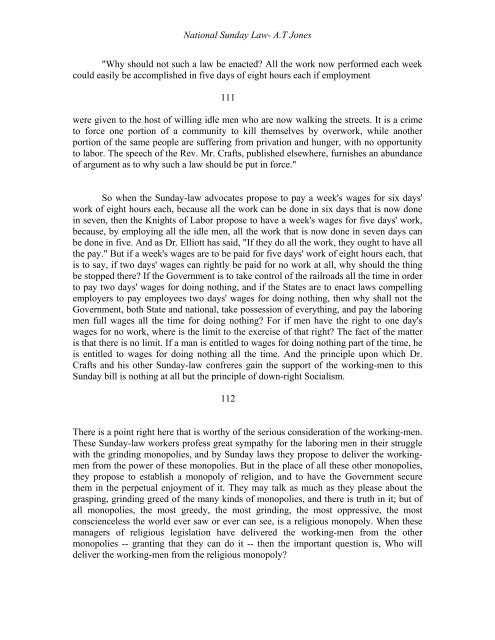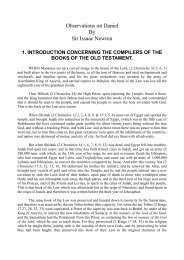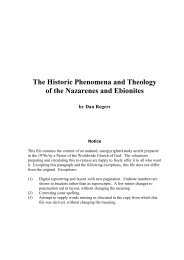THE NATIONAL SUNDAY LAW, ARGUMENT OF ALONZO T ...
THE NATIONAL SUNDAY LAW, ARGUMENT OF ALONZO T ...
THE NATIONAL SUNDAY LAW, ARGUMENT OF ALONZO T ...
You also want an ePaper? Increase the reach of your titles
YUMPU automatically turns print PDFs into web optimized ePapers that Google loves.
National Sunday Law- A.T Jones<br />
"Why should not such a law be enacted? All the work now performed each week<br />
could easily be accomplished in five days of eight hours each if employment<br />
111<br />
were given to the host of willing idle men who are now walking the streets. It is a crime<br />
to force one portion of a community to kill themselves by overwork, while another<br />
portion of the same people are suffering from privation and hunger, with no opportunity<br />
to labor. The speech of the Rev. Mr. Crafts, published elsewhere, furnishes an abundance<br />
of argument as to why such a law should be put in force."<br />
So when the Sunday-law advocates propose to pay a week's wages for six days'<br />
work of eight hours each, because all the work can be done in six days that is now done<br />
in seven, then the Knights of Labor propose to have a week's wages for five days' work,<br />
because, by employing all the idle men, all the work that is now done in seven days can<br />
be done in five. And as Dr. Elliott has said, "If they do all the work, they ought to have all<br />
the pay." But if a week's wages are to be paid for five days' work of eight hours each, that<br />
is to say, if two days' wages can rightly be paid for no work at all, why should the thing<br />
be stopped there? If the Government is to take control of the railroads all the time in order<br />
to pay two days' wages for doing nothing, and if the States are to enact laws compelling<br />
employers to pay employees two days' wages for doing nothing, then why shall not the<br />
Government, both State and national, take possession of everything, and pay the laboring<br />
men full wages all the time for doing nothing? For if men have the right to one day's<br />
wages for no work, where is the limit to the exercise of that right? The fact of the matter<br />
is that there is no limit. If a man is entitled to wages for doing nothing part of the time, he<br />
is entitled to wages for doing nothing all the time. And the principle upon which Dr.<br />
Crafts and his other Sunday-law confreres gain the support of the working-men to this<br />
Sunday bill is nothing at all but the principle of down-right Socialism.<br />
112<br />
There is a point right here that is worthy of the serious consideration of the working-men.<br />
These Sunday-law workers profess great sympathy for the laboring men in their struggle<br />
with the grinding monopolies, and by Sunday laws they propose to deliver the workingmen<br />
from the power of these monopolies. But in the place of all these other monopolies,<br />
they propose to establish a monopoly of religion, and to have the Government secure<br />
them in the perpetual enjoyment of it. They may talk as much as they please about the<br />
grasping, grinding greed of the many kinds of monopolies, and there is truth in it; but of<br />
all monopolies, the most greedy, the most grinding, the most oppressive, the most<br />
conscienceless the world ever saw or ever can see, is a religious monopoly. When these<br />
managers of religious legislation have delivered the working-men from the other<br />
monopolies -- granting that they can do it -- then the important question is, Who will<br />
deliver the working-men from the religious monopoly?
















